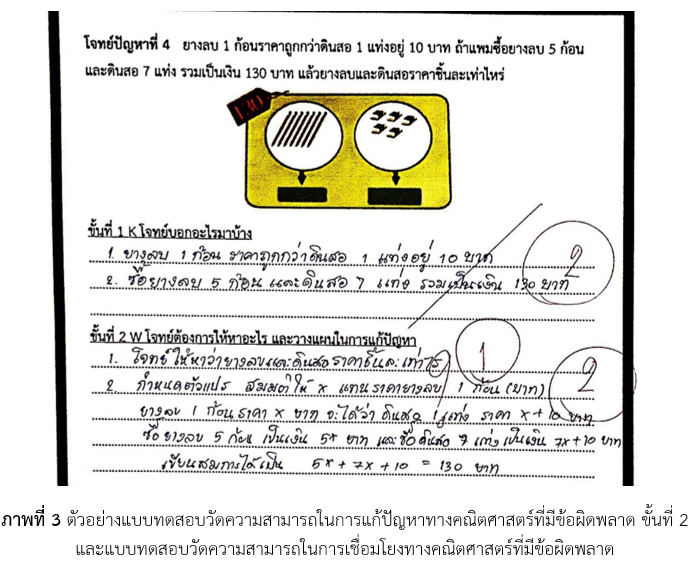ผลการจัดกิจกรรมการเรียนรู้โดยใช้เทคนิค STAD ร่วมกับ เทคนิค KWDL ที่มีต่อความสามารถในการแก้ปัญหาและการเชื่อมโยงทางคณิตศาสตร์ เรื่อง สมการเชิงเส้นตัวแปรเดียว ของนักเรียนชั้นมัธยมศึกษาปีที่ 1
Main Article Content
บทคัดย่อ
การวิจัยครั้งนี้มีวัตถุประสงค์เพื่อแผนพัฒนาการจัดกิจกรรมการเรียนรู้โดยใช้เทคนิค STAD ร่วมกับเทคนิค KWDL และเพื่อเปรียบเทียบผลสัมฤทธิ์ทางการเรียนคณิตศาสตร์ ความสามารถในการแก้ปัญหาและความสามารถในการเชื่อมโยงคณิตศาสตร์ เรื่อง สมการเชิงเส้นตัวแปรเดียว ของนักเรียนชั้นมัธยมศึกษาปีที่ 1 เทียบกับเกณฑ์ที่กำหนด กลุ่มตัวอย่างที่ใช้ในการวิจัยครั้งนี้ ได้แก่ นักเรียนชั้นมัธยมศึกษาปีที่ 1 โรงเรียนมัธยมศึกษาแห่งหนึ่งในจังหวัดบุรีรัมย์ ที่กำลังศึกษาอยู่ในภาคเรียนที่ 2 ปีการศึกษา 2564 จำนวน 40 คน ซึ่งได้มาจากการสุ่มแบบกลุ่ม โดยใช้ห้องเรียนเป็นหน่วยในการสุ่ม จำนวน 1 ห้องเรียน และใช้รูปแบบการวิจัยแบบกึ่งทดลอง เครื่องมือที่ใช้ในการวิจัย ประกอบด้วย แผนการจัดกิจกรรมการเรียนรู้โดยใช้เทคนิค STAD ร่วมกับเทคนิค KWDL แบบทดสอบวัดผลสัมฤทธิ์ทางการเรียน และแบบทดสอบวัดความสามารถในการแก้ปัญหาและการเชื่อมโยงทางคณิตศาสตร์ สถิติที่ใช้ในการวิเคราะห์ข้อมูล ได้แก่ ร้อยละ ค่าเฉลี่ย ส่วนเบี่ยงเบนมาตรฐาน และทดสอบสมมติฐานโดยใช้สูตร t – test for one sample ผลการวิจัย พบว่า แผนการจัดกิจกรรมการเรียนรู้ที่ผู้วิจัยสร้างขึ้นมีประสิทธิภาพสูงกว่าเกณฑ์ที่กำหนด ผลสัมฤทธิ์ทางการเรียนคณิตศาสตร์ของนักเรียน เฉลี่ยแล้วสูงกว่าเกณฑ์ที่กำหนดไว้ อย่างมีนัยสำคัญทางสถิติที่ระดับ .05 ความสามารถในการแก้ปัญหาและความสามารถในการเชื่อมโยงทางคณิตศาสตร์ เฉลี่ยแล้วสูงกว่าเกณฑ์ที่กำหนดไว้ อย่างมีนัยสำคัญทางสถิติที่ระดับ .05
Article Details

อนุญาตภายใต้เงื่อนไข Creative Commons Attribution-NonCommercial-NoDerivatives 4.0 International License.
วารสารวิทยาศาสตร์และวิทยาศาสตร์ศึกษา (JSSE) เป็นผู้ถือลิสิทธิ์บทความทุกบทความที่เผยแพร่ใน JSSE นี้ ทั้งนี้ ผู้เขียนจะต้องส่งแบบโอนลิขสิทธิ์บทความฉบับที่มีรายมือชื่อของผู้เขียนหลักหรือผู้ที่ได้รับมอบอำนาจแทนผู้เขียนทุกนให้กับ JSSE ก่อนที่บทความจะมีการเผยแพร่ผ่านเว็บไซต์ของวารสาร
แบบโอนลิขสิทธิ์บทความ (Copyright Transfer Form)
ทางวารสาร JSSE ได้กำหนดให้มีการกรอกแบบโอนลิขสิทธิ์บทความให้ครบถ้วนและส่งมายังกองบรรณาธิการในข้อมูลเสริม (supplementary data) พร้อมกับนิพนธ์ต้นฉบับ (manuscript) ที่ส่งมาขอรับการตีพิมพ์ ทั้งนี้ ผู้เขียนหลัก (corresponding authors) หรือผู้รับมอบอำนาจ (ในฐานะตัวแทนของผู้เขียนทุกคน) สามารถดำเนินการโอนลิขสิทธิ์บทความแทนผู้เขียนทั้งหมดได้ ซึ่งสามารถอัพโหลดไฟล์บทความต้นฉบับ (Manuscript) และไฟล์แบบโอนลิขสิทธิ์บทความ (Copyright Transfer Form) ในเมนู “Upload Submission” ดังนี้
1. อัพโหลดไฟล์บทความต้นฉบับ (Manuscript) ในเมนูย่อย Article Component > Article Text
2. อัพโหลดไฟล์แบบโอนลิขสิทธิ์บทความ (Copyright Transfer Form) ในเมนูย่อย Article Component > Other
ดาวน์โหลด ไฟล์แบบโอนลิขสิทธิ์บทความ (Copyright Transfer Form)
เอกสารอ้างอิง
Boonprajak, S. (1997). Development of Matheatical Power Power of Mathayomsuksa 1 students throguh Cooperative Learning (in Thai). Ph.D. Thesis. Bangkok: Srinakharinwirot University.
Chadwiwattanagan, P. (2020). A study of mathematical problem solving ability and learning achievement through Student Team – Achievement Division (STAD) with KWDL technique of Mathayomsuksa 3 students (in Thai). Master’s Thesis. Chonburi: Burapha University.
Kamhongsa, S. (2013). Comparison of learning achievement in linear equation of Mathayomsuksa 1 students between STAD cooperative learning and normal learning (in Thai). Master’s Thesis. Mahasarakham: Mahasarakham University.
Ponsen, P. (2013). Comparison of learning achievement, reasoning on probability and attitude towards mathematics between the KWDL Learning Activities and the TAI learning activities for Mathayomsuksa 5 students (in Thai). Master’s Thesis. Mahasarakham: Mahasarakham University.
Prathumchat, N. (2017). Development of mathematics learning activities by using the cooperative learning STAD Technique and KWDL technique on a topic of fraction and applications for Prathomsuksa 5 students (in Thai). Master’s Thesis. Mahasarakham: Mahasarakham University.
Ra-Ngubtook, W. (1999). Teaching and Learning that Focuses on Student-Centered Learning (in Thai). Bangkok: Ton – or.
Sittisomboon, M. (2008). Local Curriculum Development, 1st print (in Thai). Phitsanulok: Faculty of Education. Naresuan University.
Sutthirat, C. (2009). 80 Innovations in Learning Management with a Student-Centered Focus (in Thai). Bangkok: Danek Inter Corporation Co., Ltd.
The Ministry of Education. (2008). The Basic Education Core Curriculum B.E. 2551 (A.D. 2008) (in Thai). Bangkok: The Ministry of Education.
Wilson, J. W. (1971). Evaluation of learning in secondary school mathematics. Handbook on formative and summative evaluation of student learning.


